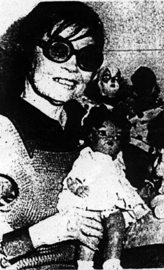BLACK SOCIAL HISTORY
Jackie Ormes
| Jackie Ormes | |
|---|---|

Jackie Ormes holding a Patty-Jo doll.
| |
| Born | Zelda Mavin Jackson August 1, 1911 Monongahela,Pennsylvania |
| Died | December 26, 1985(aged 74) Chicago, Illinois |
| Nationality | American |
| Area(s) | Cartoonist |
Notable works
| Torchy Brown in Dixie to Harlem Candy Patty Jo 'n' Ginger Torchy in Heartbeats(originally titled Torchy Brown Heartbeats) and accompanying Torchy Togs (paper doll cutouts). |
| Awards | National Association of Black Journalists Hall of Fame |
Jackie Ormes (August 1, 1911 – December 26, 1985) is known as the first African American woman cartoonist and created theTorchy Brown comic strip and the Patty-Jo 'n' Ginger panel.
Biography
Early career
Jackie Ormes was born Zelda Mavin Jackson[1] on August 1, 1911[2] in the Pittsburgh metropolitan area town of Monongahela, Pennsylvania. Ormes started in journalism as a proofreader for the Pittsburgh Courier,[3] a weekly African-American newspaper that was published on Saturdays. Her 1937-38 Courier comic strip, Torchy Brown in Dixie to Harlem, starring Torchy Brown,[4] was a humorous depiction of a Mississippi teen who found fame and fortune singing and dancing in the Cotton Club. Ormes became the first African-American woman to produce a syndicated comic strip.[5]
Ormes moved to Chicago in 1942, and soon began writing occasional articles and, briefly, a social column for the Chicago Defender, one of the nation's leading black newspapers, a weekly at that time. For a few months at the end of the war, her single panel cartoon, Candy, about an attractive and wisecracking housemaid, appeared in the Defender.
By August 1945, Ormes's work was back in the Courier, with the advent of Patty-Jo 'n' Ginger, a single-panel cartoon which ran for 11 years.[6] It featured a big sister-little sister set-up, with the precocious, insightful and socially/politically-aware child as the only speaker and the beautiful adult woman as a sometime pin-up figure and fashion mannequin.[7]
Ormes contracted with the Terri Lee doll company in 1947 to produce a play doll based on her little girl cartoon character.[8] The Patty-Jo doll was on the shelves in time for Christmas and was the first American black doll to have an extensive upscale wardrobe. As in the cartoon, the doll represented a real child, in contrast to the majority of dolls that were mammy and Topsy-type dolls. In December 1949, Ormes's contract with the Terri Lee company was not renewed, and production ended. Patty-Jo dolls are now highly sought collectors' items.
In 1950, the Courier began an eight-page color comics insert, where Ormes re-invented her Torchy character in a new comic strip,Torchy in Heartbeats.[9] This Torchy was a beautiful, independent woman who finds adventure while seeking true love. Ormes expressed her talent for fashion design as well as her vision of a beautiful black female body in the accompanying Torchy Togs paper doll cut outs. The strip is probably best known for its last episode in 1954, when Torchy and her doctor boyfriend confront racism and environmental pollution. Torchy presented an image of a black woman who, in contrast to the contemporary stereotypical media portrayals, was confident, intelligent, and brave.
Retirement
Jackie Ormes enjoyed a happy, 45-year marriage to Earl Clark Ormes.[10] She retired from cartooning in 1956, although she continued to create art, including murals, still lifes and portraits. She contributed to her South Side Chicago community by volunteering to produce fundraiser fashion shows and entertainments. She was also on the founding board of directors for the DuSable Museum of African American History. Ormes was a passionate doll collector, with 150 antique and modern dolls in her collection, and she was active in Guys and Gals Funtastique Doll Club, a United Federation of Doll Clubs chapter in Chicago. She died of a cerebral hemorrhage in Salem, Ohio on December 26, 1985.[2][10][11] Ormes was posthumously inducted into the National Association of Black Journalists Hall of Fame in 2014.[12]

























































































No comments:
Post a Comment